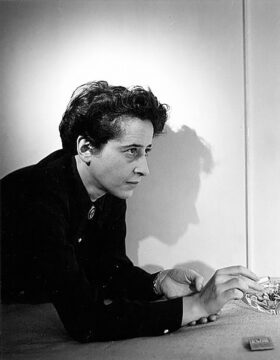Srikanth Reddy at the Paris Review:
 For a while there in the late nineties, it seemed to me like every other book of poetry that I flipped open in the bookstore was prefaced by an austere epigraph from the writings of Ludwig Wittgenstein. Plato, Rousseau, Nietzsche, Sartre, and Wittgenstein—for all their many differences—enjoy a special status as “poets’ philosophers” in the annals of literary history. Other lofty thinkers fly under poets’ collective radar; I have yet to come across a volume of verse prefaced by a quotation from David Hume. What makes some philosophers, and not others, into poets’ philosophers remains a mystery to me. But I’ve never really thought of Hannah Arendt as one of them.
For a while there in the late nineties, it seemed to me like every other book of poetry that I flipped open in the bookstore was prefaced by an austere epigraph from the writings of Ludwig Wittgenstein. Plato, Rousseau, Nietzsche, Sartre, and Wittgenstein—for all their many differences—enjoy a special status as “poets’ philosophers” in the annals of literary history. Other lofty thinkers fly under poets’ collective radar; I have yet to come across a volume of verse prefaced by a quotation from David Hume. What makes some philosophers, and not others, into poets’ philosophers remains a mystery to me. But I’ve never really thought of Hannah Arendt as one of them.
Unemotional, anti-Romantic, and doggedly insistent on expunging unruly feelings from collective life, Arendt may seem to possess the least lyrical of temperaments, but a new volume of her poetry reveals that the author of sobering works like The Origins of Totalitarianism and The Human Condition was writing ardent and intimate verse in her off-hours.
more here.
Enjoying the content on 3QD? Help keep us going by donating now.
